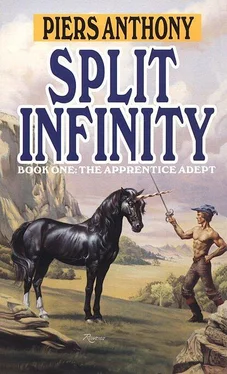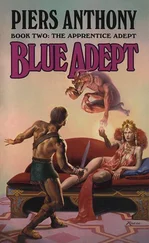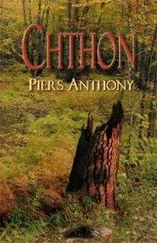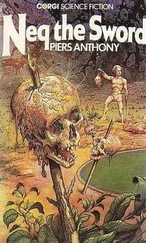Piers Anthony - Split Infinity
Здесь есть возможность читать онлайн «Piers Anthony - Split Infinity» весь текст электронной книги совершенно бесплатно (целиком полную версию без сокращений). В некоторых случаях можно слушать аудио, скачать через торрент в формате fb2 и присутствует краткое содержание. Год выпуска: 2011, Жанр: Фэнтези, на английском языке. Описание произведения, (предисловие) а так же отзывы посетителей доступны на портале библиотеки ЛибКат.
- Название:Split Infinity
- Автор:
- Жанр:
- Год:2011
- ISBN:нет данных
- Рейтинг книги:5 / 5. Голосов: 1
-
Избранное:Добавить в избранное
- Отзывы:
-
Ваша оценка:
- 100
- 1
- 2
- 3
- 4
- 5
Split Infinity: краткое содержание, описание и аннотация
Предлагаем к чтению аннотацию, описание, краткое содержание или предисловие (зависит от того, что написал сам автор книги «Split Infinity»). Если вы не нашли необходимую информацию о книге — напишите в комментариях, мы постараемся отыскать её.
Split Infinity — читать онлайн бесплатно полную книгу (весь текст) целиком
Ниже представлен текст книги, разбитый по страницам. Система сохранения места последней прочитанной страницы, позволяет с удобством читать онлайн бесплатно книгу «Split Infinity», без необходимости каждый раз заново искать на чём Вы остановились. Поставьте закладку, и сможете в любой момент перейти на страницу, на которой закончили чтение.
Интервал:
Закладка:
“I’ll look for one tomorrow,” he promised.
“Not tomorrow. First thing in the morning, you have an appointment to meet your current employer. This Citizen is very keen on the Game.”
Exasperated, he rolled over and grabbed her. “The irony is,” he said into her soft hair, “you are now more real to me than most real girls I have known. When I told you to brush up on your humanoid wiles, I didn’t mean at my expense.”
“Then you should have said that. I take things literally, because I’m only a—“
He shut her up with a kiss. But the thoughts she had voiced were only a reflection of those he was having. How long could he continue with half-women?
In the morning he met his employer. This was, to his surprise, a woman. No wonder Sheen had had women on her mind! The Citizen was elegantly gowned and coined: a handsome lady of exquisitely indeterminate age. She was, of course, substantially taller than he, but had the grace to conceal this by remaining seated in his presence. “Sir,” Stile said. All Citizens were sir, regard-less of sex or age.
“See that you qualify for the Tourney,” she said with polite force. “Excused.” That was that. If he lost one Game, this employer would cut him off as cleanly as his prior one had. He was supposed to feel deeply honored that she had granted him this personal audience—and he did. But his recent experience in Phaze had diminished his awe of Citizens. They were, after all, only people with a lot of wealth and power.
Stile and Sheen went for his challenge for Rung Seven. His employer surely had bets on his success. There were things about this that rankled, but if he fouled up. Sheen would be the one to pay. She lacked his avenue of escape to a better world. He had to do what he could for her, until he figured out some better alternative.
The holder of Rung Seven kept his appointment—as he had to, lest he forfeit. He was not much taller than Stile and tended to avoirdupois despite the antifat medication in the standard diet. Hence his name. Snack. He hardly looked like a formidable player—but neither did Stile.
An audience had gathered, as Sheen had predicted. It was possible that some Citizens also were viewing the match on their screens—especially his own employer. Stile’s move was news.
Snack got the numbered facet of the grid. Stile sighed inaudibly; he had been getting bad breaks on facets in this series. Snack always selected MENTAL.
Very well. Stile would not choose NAKED, because Snack was matchless at the pure mental games. Snack was also uncomfortably sharp at MACHINE- and ANIMAL-assisted mental efforts. Only in TOOL did Stile have an even chance. So it had to come up 2B.
There was a murmur of agreement from the spectators outside, as they watched on the public viewscreen. They had known what the opening box would be. They were waiting for the next grid.
In a moment it appeared: sixteen somewhat arbitrary classifications of games of intellectual skill. Snack had the numbered facet again, which was the primary one. He would go for his specialty: chess. He was versed in all forms of that game: the western-Earth two- and three-dimensional variants, the Chinese Choo-hong-ki, Japanese Shogi, Indian Chaturanga and the hypermodern developments. Stile could not match him there. He had a better chance with the single-piece board games like Chinese Checkers and its variants—but many games used the same boards as chess, and this grid classified them by their boards. Better to avoid that whole bailiwick.
Stile chose the C row, covering jigsaw-type puzzles, hunt-type board games—he liked Fox & Geese—the so-called pencil-and-paper games and, in the column he expected to intersect, the enclosing games.
It came up 2C: Enclosing. There was another murmur of excitement from the audience.
Now the handmade grid. Stile felt more confidence here; he could probably take Snack on most of these variants. They completed a subgrid of only four: Go, Go-bang, Yote and tic-tac-toe. Stile had thrown in the last whimsically. Tic-tac-toe was a simplistic game, no challenge, but in its essence it resembled the prototype for the grids of the Game. The player who got three of his choices in a row, then had the luck to get the facet that enabled him to choose that row, should normally win. The ideal was to establish one full row and one full column, so that the player had winners no matter which facet he had to work with. But in the Game-grids, there was no draw if no one lined up his X’s and 0’s; the real play was in the choosing of columns and the interaction of strategies.
And they intersected at tic-tac-toe. That was what he got for fooling around.
Stile sighed. The problem with this little game was that, among competent players, it was invariably a draw. They played it right here on the grid-screen, punching buttons for X’s and 0’s. To a draw.
Which meant they had to run the grid again, to achieve the settlement. They played it—and came up with the same initial box as before. And the same secondary box. Neither player was going to yield one iota of advantage for the sake of variation; to do so would be to lose. But the third grid developed a different pat-tern, leading to a new choice: Go-bang.
This was a game similar to tic-tac-toe, but with a larger grid allowing up to nineeten markers to be played on a side. It was necessary to form a line of five in a row to win. This game, too, was usually to a draw, at this level.
They drew. Each was too alert to permit the other to move five in a row. Now they would have to go to a third Game. But now the matter was more critical. Any series that went to three draws was presumed to be the result of incompetence or malingering; both parties would be suspended from Game privileges for a period, their Rungs forfeit. It could be a long, hard climb up again, for both—and Stile had no time for it. The third try, in sum, had to produce a winner.
They ran the grids through again—and arrived again at tool-assisted mental, and at enclosing. The basic strategies were immutable.
Stile exchanged glances with Snack. Both knew what they had to do.
This time it came up Go—the ancient Chinese game of enclosing. It was perhaps the oldest of all games in the human sphere, dating back several thousand years. It was one of the simplest in basic concept: the placing of colored stones to mark off territory, the player en-closing the most territory winning. Yet in execution it was also one of the most sophisticated of games. The more skilled player almost invariably won.
The problem was. Stile was not certain which of them was the more skilled in Go. He had never played this particular game with this particular man, and could not at the moment remember any games of Go he and Snack had played against common opponents. This was certainly not Stile’s strongest game—but he doubted it was Snack’s strongest either.
They moved to the board-game annex, as this match would take too long for the grid-premises; others had to use that equipment. The audience followed, taking seats; they could tune in on replicas of the game at each place, but preferred to observe it physically. Sheen had a front seat, and looked nervous: probably an affectation, considering her wire nerves.
Stile would have preferred a Game leading to a quick decision, for he was conscious of Neysa and Kurrelgyre in the other frame, locked in potion-hardened cages. But he had to meet his commitment here, first, whatever it took.
They sat on opposite sides of the board, each with a bowl of polished stones. Snack gravely picked up one stone of each color, shook them together in his joined hands, and offered two fists for Stile. Stile touched the left. The hand opened to reveal a black pebble.
Stile took that stone and laid it on the board. Black, by convention, had the first move. With 361 intersections to choose from—for the stones were placed on the lines in Go, not in the squares—he had no problem. A one-stone advantage was not much, but in a game as precise as this it helped.
Читать дальшеИнтервал:
Закладка:
Похожие книги на «Split Infinity»
Представляем Вашему вниманию похожие книги на «Split Infinity» списком для выбора. Мы отобрали схожую по названию и смыслу литературу в надежде предоставить читателям больше вариантов отыскать новые, интересные, ещё непрочитанные произведения.
Обсуждение, отзывы о книге «Split Infinity» и просто собственные мнения читателей. Оставьте ваши комментарии, напишите, что Вы думаете о произведении, его смысле или главных героях. Укажите что конкретно понравилось, а что нет, и почему Вы так считаете.










